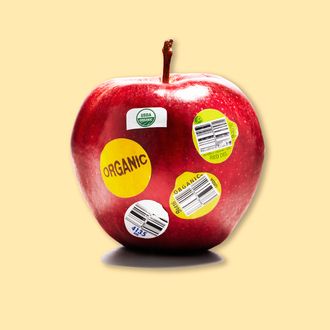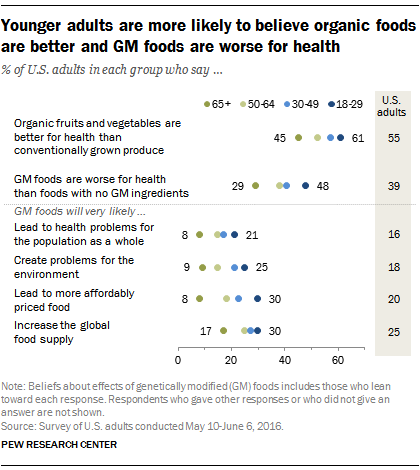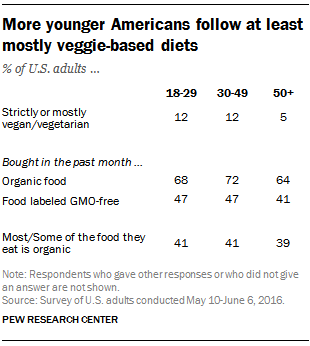
It’s important not to fall into the many lazy story lines about millennials being coddled or oversensitive or anti-free-speech or wildly promiscuous or whatever else. One shouldn’t ever make generalizations about a whole generation, and the generalizations made about millennials, coming as they are in the age of the outrage-inducing hot take and a fair amount of economic turmoil that can mask complexity — “Millennials keep moving back home!” Yeah, because they can’t find decent-paying jobs — tend to be particularly dumb.
So I’ll try to phrase my reaction to the data Pew Research just released yesterday in a measured way: Millennials have some views about what they should and shouldn’t eat that aren’t quite backed up by science.
Take, for example, this chart:

As the numbers show, almost half of those in the 18-to-29 age range believe genetically modified foods pose health risks. Drilling down to more specific results, a fifth and a fourth of millennials believe, respectively, that genetically modified foods will “very likely” lead to health problems or create problems for the environment.
None of these beliefs reflect the consensus of scientists. On GM foods, a long-standing campaign of misinformation from some environmental activists has severely misled concerned consumers. As the headline of Will Saletan’s must-read long article on the subject puts it, “The war against genetically modified organisms is full of fearmongering, errors, and fraud.” GM foods are safe to eat, and while like any agricultural technology GMOs need to be deployed responsibly, they also don’t pose any unique, undue threat to the environment. (I would guess millennials are also overestimating the health benefits of eating foods marked “organic,” but at least that term has a specific, well-defined meaning according to the federal government, as opposed to labels like “natural” or “all-natural” and so on, which can often be effectively meaningless, except as a near-religious mark of symbolic purity.)
There’s a tiny bit of good news, at least, if you look at this chart:

Younger people are significantly more likely to follow vegetarian or vegan diets, though the numbers are still quite low. Here, there’s some actual science to back up the decision, given studies showing that heavy meat consumption — particularly red meat — is associated with an increased risk of mortality.
It’s unfortunate so many more millennials are hung up on GM and organic foods than on reducing their meat intake. It isn’t a mystery why: Young people are probably a lot more likely to identify as environmentalists and/or to go out of their way to explore healthy eating, and if you start hanging out with or talking to people with these interests, you’ll likely encounter a lot of loudly communicated social norms and expectations in opposition to genetically modified foods. That doesn’t mean that there are sound scientific reasons to shun GMOs, though.




